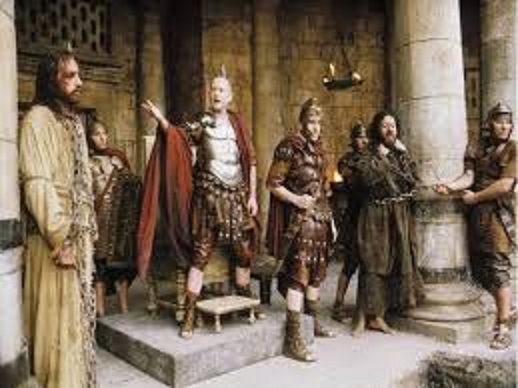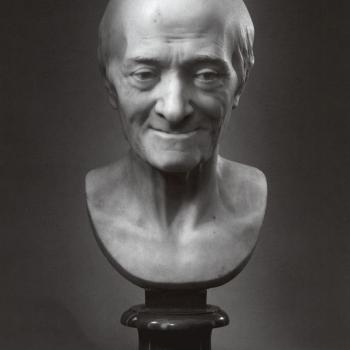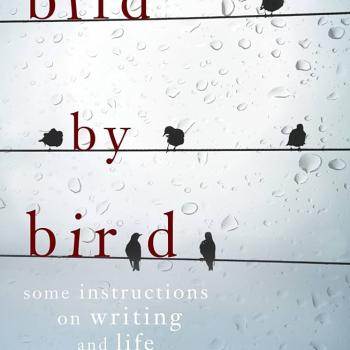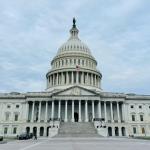An annual musical fixture of my Baptist upbringing was the Easter Cantata. Each year on Easter evening our small choir would perform a contemporary setting of the Passion and Easter story from Last Supper through the Resurrection. My aunt Gloria was the choir director, several of my relatives sang in the choir from my pre-teen years on, and from about age twelve through high school I was the piano accompanist for this annual event. We weren’t that good and the quality of the music we performed was even worse, cranked out in some evangelical music factory on a regular basis in a sad mockery of the superhuman weekly cantata-composing efforts of my musical hero, Johann Sebastian Bach, in 18thcentury Leipzig.
The cantata score each year as well as our performance was completely forgettable, but I was reminded the other day of a striking feature of each cantata. During the portion portraying Jesus’ trial before Pilate, one male would sing the part of Pilate (my cousin Greg one year), another would be Jesus (my cousin Greg a different year), and the rest of the choir was the crowd singing “Release unto us Barabbas!” “Away with this man!” “We have no king but Caesar!” and “Crucify him!”

I remember clearly the strange dissonance of these lyrics sung vigorously in a building dedicated to the worship of the man being condemned to death; even though the temptation was to consider the crowd as evil sinners, I also remember wondering if there might have been more than a few well-meaning folks in the group calling for Jesus’ crucifixion who actually thought they were doing the right thing. Sometimes “Give us Barabbas!” seems to make sense.
We find ourselves in one of those times. Regular readers of this blog know that I have been wondering about how Christians who are also Republicans fit all of that together and, most recently, why so many evangelical Christians continue to support Donald Trump. I recall what one student told a member of the press after Trump gave a talk at Liberty University while still a candidate for President in 2016. He said “I know a lot of people speak of his ego and how that’s not a Christian value — but I honestly think his ego is what gets things done. I’m okay with an egotistical president. He wants to be the best, and I think for that reason, he gets things done.” When faced with the opportunity to judge a candidate according to the values he and his chosen university profess, this student chose to punt. “Give us Barabbas.”
At the gym later in the day I read an essay from Marilynne Robinson’s recent collection The Givenness of Things that shone some light on these matters. In “Awakening,” Robinson reflects on a contemporary phenomenon that runs rampant through our current public and political discourse—a professed “Christianity” that looks and sounds like anything but Christianity.
No doubt as a consequence of a recent vogue for feeling culturally embattled, the word “Christian” now is seen less as identifying an ethic, and more as identifying a demographic. On one hand I do not wish to overstate the degree to which these two uses of the word “Christian” are mutually exclusive, and on the other hand I think it would be a very difficult thing to overstate how deeply incompatible they can be.
For many people, in other words, “Christianity” has become a tribal label, a marker of “us” vs. “them,” the very sort of tribalism that currently infects and threatens to permanently damage our political and social structures. Robinson notes that when the hallmarks of being a Christian are reduced to “are you in or out?” very un-Christian consequences are inevitable.
The simple, central, urgent pressure to step over the line that separates the saved from the unsaved, and after this the right, even the obligation, to turn and judge that great sinful world the redeemed have left behind—this is what I see as the essential nature of the emerging Christianity. Those who have crossed this line can be outrageously forgiving of one another and themselves, and very cruel in their denunciations of anyone else.
How is it, I have been wondering recently, that professed Christians can support candidates and policies that are, by any stretch of the imagination, anything but embodiments of traditional Christian values? If Marilynne Robinson is right, it is because contemporary Christianity often is not a way of life or a commitment to the principles of a historic and beautiful religion—it is rather a way to facilitate what are often the worst tendencies in human nature and behavior.
People of good faith get caught up in these things in all times and all places. In the excitement of the moment who really knows he or she might not also shout, “Give us Barabbas!”
All of this sounds rather harsh and judgmental—also not congruent with Christian values. So be it. I grow weary of hearing the name of my faith used in the service of un-Christian and inhumane policies and actions, in much the same way that sincere and serious Muslims must tire of hearing their ancient religion’s name used as a placeholder and justification for terrorism and murder. The truth of the matter is that Christianity as a lived faith runs contrary to much of our deepest, natural human wiring. The first will be last; to him who asks give; turn the other cheek; judge not. Tribal Christianity, on the other hand, appeals to the worst in our nature. As Robinson points out,
It is worse than ordinary tribalism because it assumes a more than virtuous us on one side, and on the other a them who are very doubtful indeed, who are, in fact, a threat to all we hold dear . . . If the claims to Christian identity we hear now are rooted in an instinctive tribalism, they are entirely inappropriate, certainly uninformed, because in its nature the religion they claim has no boundaries, no shibboleths, no genealogies or hereditary claimants.
As Robinson writes, fear and the desire for identity and a place to belong can cause people of good will and intentions to choose and accept things that are in truth the very opposite of what they claim to believe in, even with the real thing right in front of them. But fear need not rule the day.
We should take very seriously what the dreadful past can tell us about our blindnesses and predilections. The haunting fact is that we are morally free. If everyone around us is calling for Barabbas, it is only probable—but never necessary—that some of us join in.

















